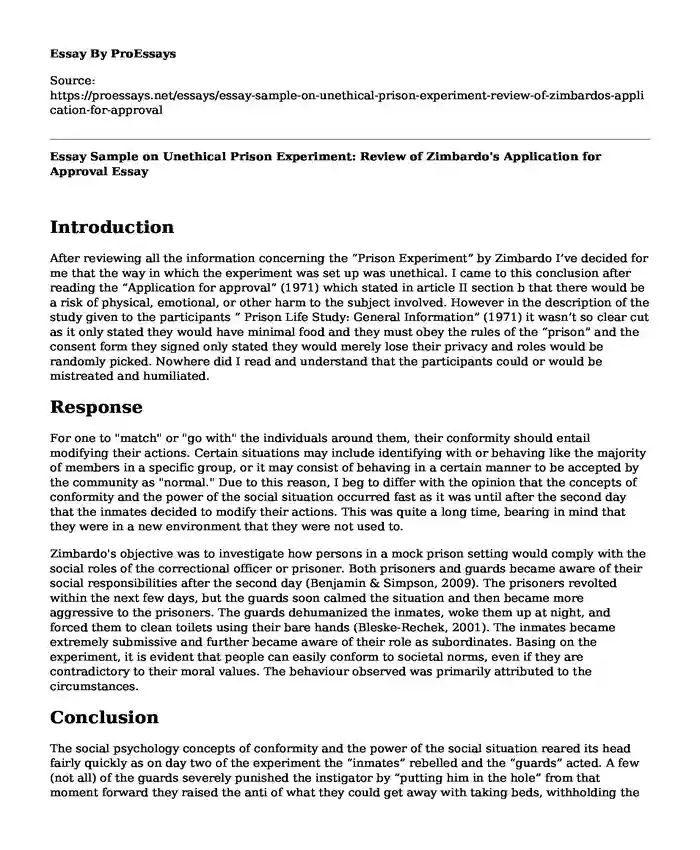Introduction
After reviewing all the information concerning the “Prison Experiment” by Zimbardo I’ve decided for me that the way in which the experiment was set up was unethical. I came to this conclusion after reading the “Application for approval” (1971) which stated in article II section b that there would be a risk of physical, emotional, or other harm to the subject involved. However in the description of the study given to the participants “ Prison Life Study: General Information” (1971) it wasn’t so clear cut as it only stated they would have minimal food and they must obey the rules of the “prison” and the consent form they signed only stated they would merely lose their privacy and roles would be randomly picked. Nowhere did I read and understand that the participants could or would be mistreated and humiliated.
Response
For one to "match" or "go with" the individuals around them, their conformity should entail modifying their actions. Certain situations may include identifying with or behaving like the majority of members in a specific group, or it may consist of behaving in a certain manner to be accepted by the community as "normal." Due to this reason, I beg to differ with the opinion that the concepts of conformity and the power of the social situation occurred fast as it was until after the second day that the inmates decided to modify their actions. This was quite a long time, bearing in mind that they were in a new environment that they were not used to.
Zimbardo's objective was to investigate how persons in a mock prison setting would comply with the social roles of the correctional officer or prisoner. Both prisoners and guards became aware of their social responsibilities after the second day (Benjamin & Simpson, 2009). The prisoners revolted within the next few days, but the guards soon calmed the situation and then became more aggressive to the prisoners. The guards dehumanized the inmates, woke them up at night, and forced them to clean toilets using their bare hands (Bleske-Rechek, 2001). The inmates became extremely submissive and further became aware of their role as subordinates. Basing on the experiment, it is evident that people can easily conform to societal norms, even if they are contradictory to their moral values. The behaviour observed was primarily attributed to the circumstances.
Conclusion
The social psychology concepts of conformity and the power of the social situation reared its head fairly quickly as on day two of the experiment the “inmates” rebelled and the “guards” acted. A few (not all) of the guards severely punished the instigator by “putting him in the hole” from that moment forward they raised the anti of what they could get away with taking beds, withholding the toilet, making humiliating remarks and unreasonable amounts of pushups and on the other side of things the inmates fell in to line trying desperately not to get in “trouble”. One “inmate” who was having a breakdown was even willing to go back in as to not be viewed as a “bad inmate” after being taunted by the others. He reluctantly decided to leave after it was explained to him the situation wasn’t real. “ In their power of position the guards dehumanized the prisoners, the prisoners became increasingly submissive, identifying further with their subordinate role.”(2017)
References
Benjamin Jr, L. T., & Simpson, J. A. (2009). The power of the situation: The impact of Milgram's obedience studies on personality and social psychology. American Psychologist, 64(1), 12.
Bleske-Rechek, A. L. (2001). Obedience, conformity, and social roles: Active learning in a large introductory psychology class. The teaching of Psychology, 28(4), 260-262.
Cite this page
Essay Sample on Unethical Prison Experiment: Review of Zimbardo's Application for Approval. (2023, Oct 15). Retrieved from https://proessays.net/essays/essay-sample-on-unethical-prison-experiment-review-of-zimbardos-application-for-approval
If you are the original author of this essay and no longer wish to have it published on the ProEssays website, please click below to request its removal:
- Prevalence and Treatment for Depression and Anxiety Among the Elderly
- History of US Law Enforcement Essay
- Essay Sample on Rights and Laws
- How ADD Affects People's Ability to Write? Essay Example
- Essay Sample on Gender-Based Crime Trends & Statistics
- Social Justice: My Story of Sadness and Hope - Essay Sample
- Essay Example on African Americans' Struggle for Equality Post WWII







